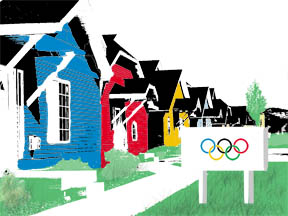Ordinance asks for community benefits

January 26, 2009
A new ordinance to secure community benefits as part of Chicago’s 2016 Olympic bid was introduced to the City Council on Jan. 13.
Ald. Pat Dowell (3rd Ward) and Ald. Toni Preckwinkle (4th Ward) joined the Communities for an Equitable Olympics (CEO 2016) to announce the ordinance, which asks the city to create affordable housing at the proposed Olympic Village site, employment opportunities for people in the local communities and support for minority contractors in the city’s plans for the 2016 summer games.
CEO 2016—a coalition of community organizations whose members include Action Now, American Friends Service Committee, Chicago Coalition for the Homeless, Grassroots Collaborative, Kenwood Oakland Community Organization and the Metropolitan Area Group for Igniting Civilization—has been working for several months with elected officials to see that all residents and local communities benefit from the city’s Olympic bid.
The ordinance calls for 30 percent of housing built at the Olympic Village site to be made affordable to residents in the community once the Olympics are over. It also asks the city to compensate anyone who ends up being displaced by the city because of construction of Olympic sites.
Shannon Bennett, a lead organizer with Kenwood Oakland Community Organization, said displacement is a major concern for community residents, especially for people who live near Michael Reese Hospital. The city has proposed using the hospital site as the Olympic Village to house the athletes during the games.
The city is also being asked to pay homeowners for the market value of their homes and give renters at least 90 days notice to vacate. The city would also have to help people relocate within the community if they are displaced and give extensive support to homeless shelters that would have to be moved or closed.
“We’ve seen issues of gentrification in every city [where past] Olympics have been held,” Bennett said. “We need to have safeguards in place to save people’s homes from being sold out from under them.”
Job creation is another big part of the proposed ordinance. It calls for 50 percent of contracts to be awarded to minority – and female – owned businesses, which Bennett said is a fairly common practice for the city. CEO 2016 wants to ensure the city also reaches out to businesses in the communities that will host Olympic venues and the coalition will offer help to businesses that bid on work.
“We want to make sure local businesses will be able to benefit [from the Olympic bid],” Bennett said.
The existing transportation infrastructure is also being targeted to be rebuilt, by rebuilding and modernizing its bus and train systems to transport visitors to and from the games. The ordinance requires Metra to increase the frequency of the Metra South Chicago line to every 10 minutes, instead of every 20, between 6 a.m. and midnight and allow riders to use CTA fare cards and transfers on Metra trains. Added Metra stops and station upgrades along the route are also proposed, as well as new stations on the CTA’s Red, Green and Pink lines.
John Peltz, 47, has lived on the South Side for more than 30 years and said he thinks it is past time for the city to make needed improvements to its aging public transportation system.
“The city has made it pretty clear that the Olympic bid is a priority,” Peltz said. “It’s nice to see these [community] organizations are trying to help regular people benefit from it.”
The ordinance will likely undergo some changes in the next few weeks in order to reach an agreement with the Chicago 2016 Committee. A city council vote could take place as early as March.







